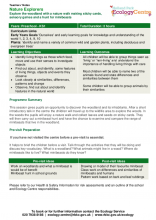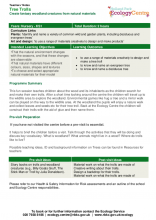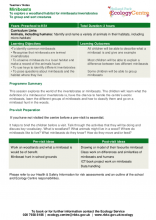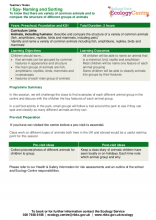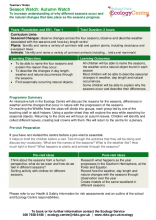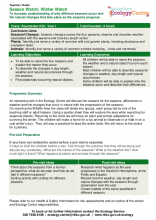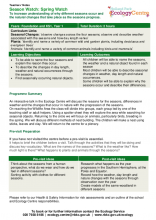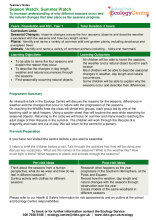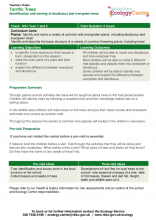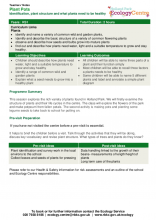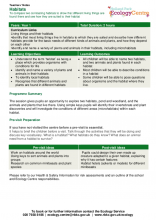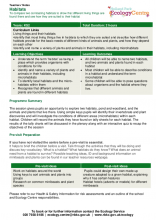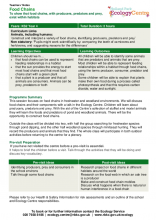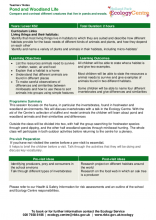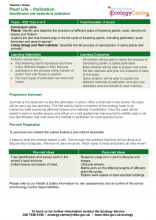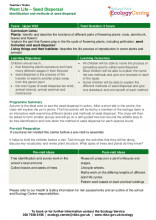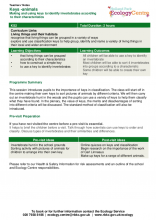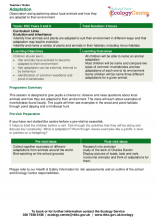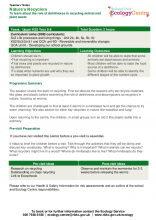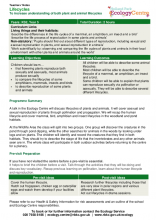Environmental Education Bookings
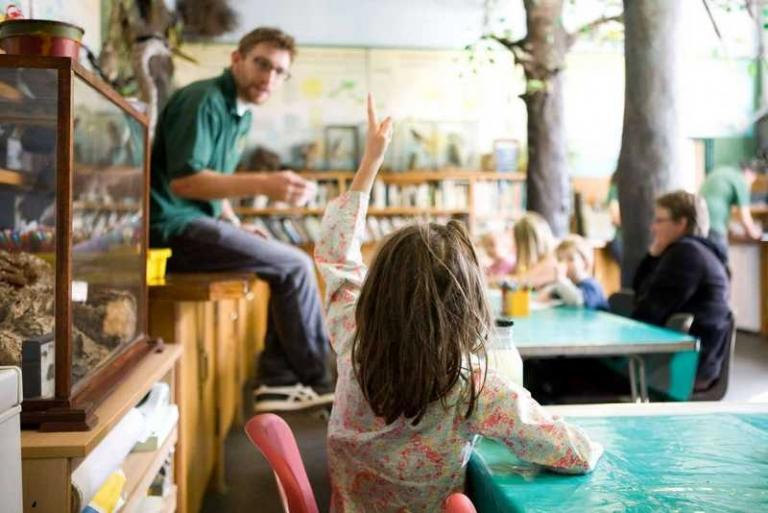
Teachers are welcome to book two-hour curriculum linked workshops at our purpose-built Ecology Centre.
The centre is well resourced with a range of scientific equipment, interactive whiteboard, live and static wildlife specimens and practical facilities including toilets and bag storage.
Outdoor investigations take place in the Holland Park Wildlife Area, a secured fenced site which features a wildlife pond with a dipping platform and woodland and grassland habitats.
If you would like to plan a school or class visit please fill in the relevant enquiry form and we can discuss the various options available for your class.
Essential preliminary visit
We recommend that prior to their visit, teachers take the opportunity to visit the Ecology Centre and familiarise themselves with the location and resources to ensure that pupils get the most from their trip.
Our workshops
Please select the programme title below to view the Teachers' notes, including curriculum links, learning objectives and outcomes.
Visits are available all year round but please book early for the summer term as it is often fully booked.
- Preschool and Foundation Stage
-
- Nature Explorers
Explore the park’s woodland with a nature walk and a hunt for minibeasts with a focus on science.
- Tree Trolls
A creative craft session to create fantasy woodland creatures with a focus on cross-curricular.
- Minibeasts
Learn about the range of creatures which can be termed minibeasts with a focus on science.
- I Spy
Learn how to sort creatures into groups with a focus on science.
- Autumn Watch
Search the woods for different signs of autumn (Autumn term only) with a focus on science.
- Winter Watch
Focus on plant and animal adaptations for surviving the winter (Autumn term 2 and Spring term 1 only) with a focus on science.
- Spring Watch
Explore the park spotting signs of spring (Spring term only) with a focus on science.
- Summer Watch
Focus on spotting signs of summer around the park (Summer term only) which will aim at learning science.
- Key Stage 1 Programmes
-
- Nature Explorers
Explore the woodland with a nature walk and a hunt for minibeasts with a focus on cross-curricular.
- Minibeasts
Explore the woodland with a nature walk and a hunt for minibeasts.
- Tree Trolls
A creative craft session to create fantasy woodland creatures with a focus on cross-curricular.
- Terrific Trees
Journey through the park carrying out fun activities to learn about trees with a focus on cross-curricular.
- I Spy
Learn how to sort creatures into groups with a focus on science.
- Plant Pots
Learn about plant lifecycles and make paper plant pots with a focus on science.
- Autumn Watch
Search the woods for different signs of autumn (Autumn term only) with a focus on science.
- Winter Watch
Focus on plant and animal adaptations for surviving the winter (Autumn term 2 and Spring term 1 only) with a focus on science.
- Spring Watch
Explore the park spotting signs of spring. (Spring term only) with a focus on science.
- Summer Watch
Focus on spotting signs of summer around the park (Summer term only) which will aim at learning science.
- Habitats
Learn how different living things are suited to their habitat with a focus on science.
- Key Stage 2 Programmes
-
- Habitats
Compare the pond and woodland habitats with a focus on science.
- Food chains
Learn about food chains with a focus on science.
- Pond and Woodland Life
Compare and contrast different creatures that live in the pods and woodlands with a focus on science.
- Plant Life - Pollination
Explore the different ways plants are pollinated (Spring or Summer terms only) with a focus on science.
- Plant Life - Seed Dispersal
Spot and identify species and their method of seed dispersal (Autumn term only) with a focus on science.
- Keys - Animals
Use different keys to identify invertebrates in two different habitats with a focus on science.
- Adaptation
Learn how animals are best adapted to their habitat with a focus on science.
- Nature's Recyclers
Learn about the role of detritivores and decomposers in the woodland and build a wormery with a focus on science.
- Lifecycles
Learn about the different types of animal lifecycles. (Spring term 2 and Summer terms only) with a focus on science.
Classification
Explore how living things can be classified into broad groups with a focus on science.
- Secondary and Tertiary Education Programmes
-
We can tailor sessions to meet your learning needs. For GCSE, BTEC, A Level and tertiary groups, sessions can be designed in consultation with you and with reference to the specific course requirements.
Visits are available all year round but please book early for the summer term as it is often fully booked.
- Food chains
Study the components of a food chain with a focus on science.
- Nature's Recyclers
Learn about the role of detritivores and decomposers in the woodland and build a wormery with a focus on science.
- Invertebrate Population Study
Estimate the populations of different woodland invertebrate species with a focus on science.
- Trees and Climate
Examine different features of tree species found in the park and how they relate to their climate with a focus on science.
- Bioindicators
Learn how a species survey can be used to assess the quality of a habitat with a focus on science.
- School visits: Fees and charges
-
April 2021 - March 2022
These charges have been set and agreed by the Cabinet member for Environment and Communities in March 2021:
Environmental Education Session - led groups RBKC state funded schools RBKC private schools and non-RBKC schools/groups workshop led by single Ecology Staff member – up to 2 hours (approx 30 children) £70 £105 Ecology Centre talk (half an hour). Charge for self-led visits that use the centre. £35 £35 attendance charge for using wildlife area or natural play area (per pupil) – up to 2 hours. This is for self-led groups, either Environmental Education or Forest School. £2.65 £3.75 Before your school visit to the Ecology Centre you will receive an invoice by post. Invoices must be paid in full within 30 days of the invoice date. Once the payment has been received, we will send you a confirmation email.
- Health and safety
-
- All our sessions have been risk assessed.
- Upon confirming a visit, teachers will be sent a copy of our Educational Visit Health and Safety Procedure and session-based risk assessment.
- Visiting schools should also complete their own risk assessments.
Supervision
All children must be supervised by adults while visiting the Ecology Centre.
Recommended ratios of adults to children of visiting groups:
age range ratio Early Years 1:4 Infants 1:6 Juniors 1:8 - the maximum class size is 30
- teachers must take full responsibility for the group whilst attending the Ecology Centre sessions
- risk assessments must be completed by the school
- Other information - availability and capacity, and lunchtime arrangements
-
Availability and centre capacity
- the centre is available from 9:30am to 3.30pm Monday to Friday, during official school terms
- sessions last from 2 hours to a full day, depending on your requirements
- sessions normally run from 10am to noon and 1 to 3pm (earlier starts and later finishes can be requested)
- the Ecology Centre can cater for groups of up to 30 children with accompanying adults
Lunchtime arrangements
- there are outdoor picnic areas, a café and ice-cream kiosk in the park
- there are unsupervised play areas including a toddler's playground (0-5 years) and an adventure playground, both within easy reach of the Ecology Centre
- the centre itself can be booked for lunch (as long as it does not conflict with another visit)
We are a holder of the Council for Learning Outside the Classroom Quality Badge. Visit the Council for Learning Outside the Classroom website for more information.
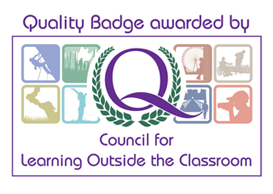
Last updated: 8 September 2021

